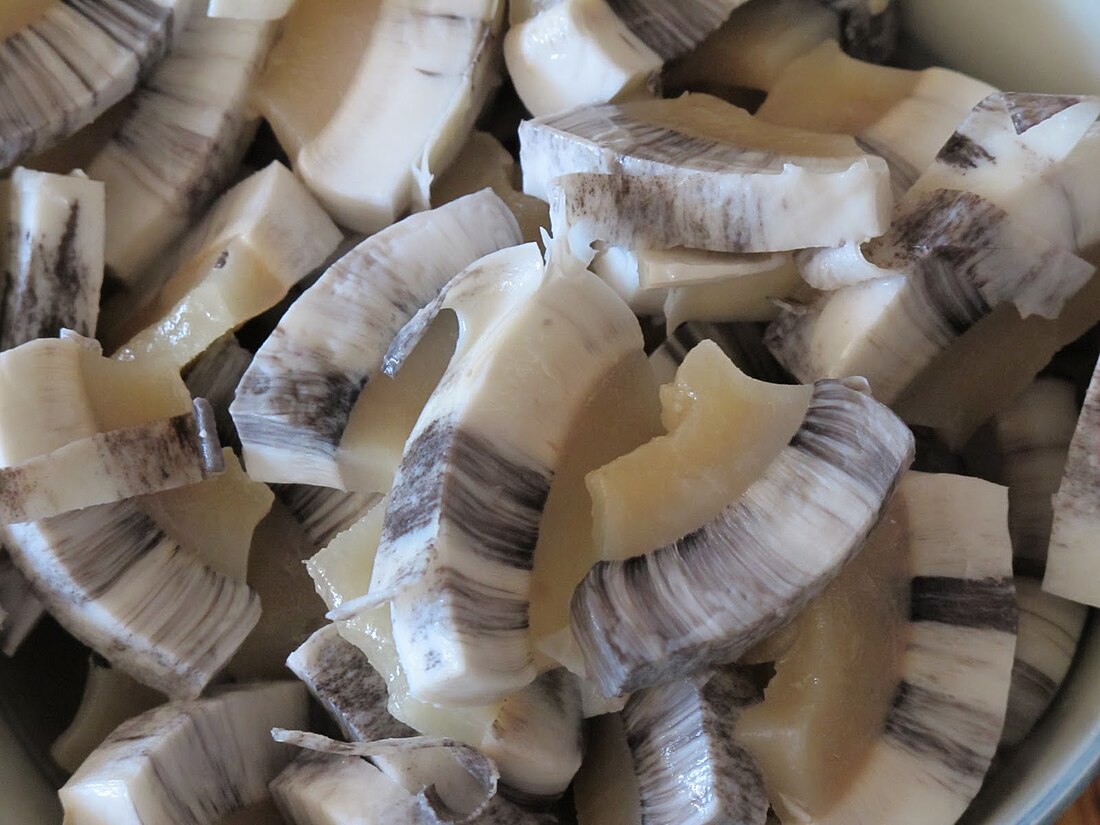Top Qs
Timeline
Chat
Perspective
Muktuk
Traditional Inuit and Chukchi food consisting of frozen whale skin and blubber From Wikipedia, the free encyclopedia
Remove ads
Muktuk[1] (transliterated in various ways, see below) is a traditional food of Inuit and other circumpolar peoples, consisting of whale skin and blubber. A part of Inuit cuisine, it is most often made from the bowhead whale, although the beluga and the narwhal are also used. It is usually consumed raw, but can also be eaten frozen, cooked,[2] or pickled.[3]

Methods of preparation


In Greenland, muktuk (mattak) is sold commercially to fish factories,[4] and in Canada (muktaaq) to other communities.[5]
When chewed raw, the blubber becomes oily, with a nutty taste; if not diced, or at least serrated, the skin is quite rubbery.[citation needed]
One account of a 21st-century indigenous whale hunt describes the skin and blubber eaten as a snack while the rest of the whale meat is butchered (flensed) for later consumption. When boiled, this snack is known as unaaliq.[6] Raw or cooked, the blubber and skin are served with HP Sauce,[6][7][8][9][10] a British condiment, or soy sauce.[11]
Remove ads
Nutrients and health concerns
Summarize
Perspective
Muktuk has been found to be a good source of vitamin C, the epidermis containing up to 38 mg (0.59 gr) per 100 grams (3.5 oz).[12][13] It was used as an antiscorbutic by British Arctic explorers.[14] Blubber is also a source of vitamin D.[15]
Proceedings of the Nutrition Society stated in the 1950s that:
The most important item of food of the Polar Eskimos is the narwhal (Monodon monoceros). [...] The skin (mattak) is greatly relished and tastes like hazel-nuts; it is eaten raw and contains considerable amounts of glycogen and ascorbic acid. The White whale (Delphinupterus leucas) is almost as important...[16]
Contaminants from the industrialised world have made their way to the Arctic marine food web. This poses a health risk to people who eat "country food" (traditional Inuit foodstuffs).[17] As whales grow, mercury accumulates in the liver, kidney, muscle, and blubber, and cadmium settles in the blubber,[18] the same process that makes mercury in fish a health issue for humans. Whale meat also bioaccumulates carcinogens such as PCBs, chemical compounds that damage human nervous, immune and reproductive systems,[19][20] and a variety of other contaminants.[21]
Consumption of muktuk has also been associated with outbreaks of botulism.[22]
Remove ads
Spellings
Transliterations of "muktuk", and other terms for the skin and blubber, include:
- Ikiilgin (Икииԓгин), Chukchi
- Maktaaq (ᒪᒃᑖᖅ), Sallirmiutun (Siglitun), Kivalliq, Aivilingmiutut (Aivilik), North Baffin, East Baffin, South Baffin[23]
- Maktak (ᒪᒃᑕᒃ), Iñupiaq,[24] Sallirmiutun, North Baffin[25]
- Maktaq, Inuinnaqtun,[26] Natsilingmiutut (Inuvialuktun)[27]
- Mattak, Labrador, Greenland[28]
- Mangtak, Alaskan Yupʼik[29]
- Mungtuk, Siberian Yupik
- Kimaq, Alutiiq (Sugpiaq)
In some dialects, such as Inuinnaqtun, the word muktuk refers only to the edible parts of the whale's skin and not to the blubber.[26][30]
See also
- Nalukataq, spring whaling festival
- Marine mammals as food
- Chukchi cuisine
References
External links
Wikiwand - on
Seamless Wikipedia browsing. On steroids.
Remove ads
